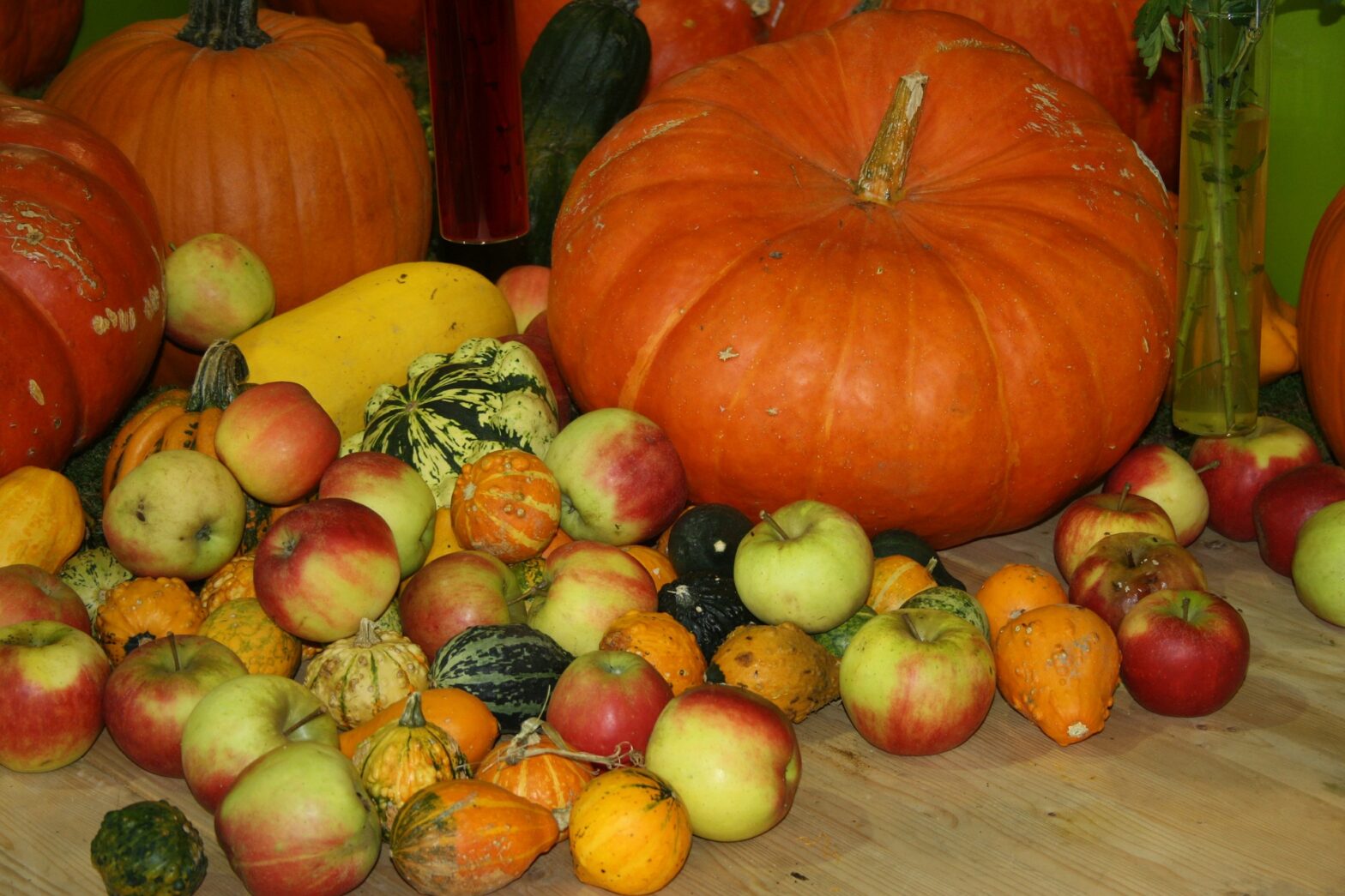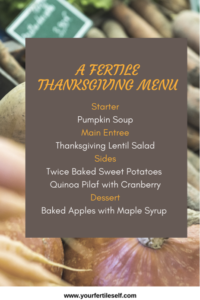Fertile Foods for Your Thanksgiving Table: A Fertility-Friendly Thanksgiving Menu

Thanksgiving is next week! If you’re anything like me, you’re getting started now on planning your menu.
Thanksgiving is my very favorite holiday because unlike Christmas, it’s not laden with expectation and obligation. It’s simply about gathering around the table with loved ones for fellowship and a delicious meal.
Thanksgiving might not be steeped in expectations but it is steeped in culinary ritual. Everyone’s traditions may be different but it’s safe to say that Thanksgiving usually consists of turkey and a smorgasbord of brown or beige side dishes, maybe a vegetable and definitely a pastry dessert (or 3).
It’s a delicious meal but not necessarily the most healthy. And, if you’re trying to conceive a child and struggling, Thanksgiving dinner, with its white carbs, refined sugars and fattening pastries, may not be the most friendly meal for your fertility.
Just as with other medical conditions, nutrition and food is a cornerstone to healthy fertility. Clean eating is one of the most powerful tools that you can have in your arsenal to help you achieve your dream of becoming a mother.
That’s because eating the right foods helps balance hormones and regulates ovulation, and issues with ovulation have been shown to be the leading cause of female infertility. For men, eating a fertility-friendly diet has been shown to increase sperm counts and improve sperm health.
Here’s a menu to ensure that you have a fertility-friendly Thanksgiving dinner. While no food can guarantee that you’ll get pregnant, these foods are all rich in essential vitamins and minerals that help balance hormone production, regulate ovulation, and enhance fertility and overall health.
It can totally replace your turkey; however, if you do still choose to have the traditional bird, these dishes will nicely complement it for a balanced, delicious Thanksgiving dinner.
The best part is, we already eat most of these foods as part of our Thanksgiving tradition. They’re just prepared in a slightly different way. So we’re not missing a thing!
Here’s a breakdown of why this is a fertility-friendly meal:
Pumpkin: Pumpkin is one of the jewels of autumn foods for boosting our fertility. Because pumpkin is high in fiber, it’s a great food to help regulate blood sugar, helping to balance hormone production. The Vitamin A that is so prevalent in pumpkin facilitates production of cervical fluid, which helps the sperm reach the egg for fertilization.
Pumpkin is rich in beta carotene, an antioxidant that’s crucial for protecting the reproductive system and the health of our precious egg cells. Beta carotene also encourages natural progesterone production, helping to prepare the uterus to receive and nourish a fertilized egg.
Sweet Potatoes: Sweet potatoes are a staple of Thanksgiving, and they’re fantastic fertility-boosting foods. Like pumpkin, sweet potatoes are a wonderful source of Vitamin A and beta carotene.
Sweet potatoes are also loaded with B vitamins as well as in Vitamin C, both of which help balance hormone production. A complex carbohydrate, sweet potatoes help stabilize blood sugar which is crucial for managing ovulation and regulating menstrual cycles overall. This is especially important for women suffering from conditions stemming from hormonal imbalances like Polycystic Ovary Syndrome (PCOS).
For men, getting vitamin C from foods like sweet potatoes helps keep their sperm in healthy shape, keeping them mobile so they can better swim to the egg!
Brussels Spouts: Thanksgiving dinner wouldn’t be complete without a yummy veggie. Brussels sprouts are ideal because they’re beneficial for both male and female fertility. For men, they help increase sperm counts and for women, they help keep the uterine lining healthy, facilitating successful implantation of an embryo after conception.
Eating Brussels sprouts also reduces inflammation, which helps keep chronic illness at bay, and helps lower cholesterol levels, so these little cabbages are great for improving overall health as well as fertility.
Butternut Squash: Like pumpkin and sweet potatoes, butternut squash is a great source of fiber and beta carotene for fertility. It’s also loaded with essential vitamins and minerals, including Vitamin A (great for sperm health and overall hormone production, and one serving of butternut squash covers your entire daily recommended value!), Vitamin C (essential for healthy ovulation) and carotenes (good for egg health). It’s also a great source for healthy carbs, which makes it a great choice for women with PCOS.
Lentils: A member of the bean family, lentils have loads of potential for boosting fertility. Beans are high in fiber, low in fat, a good source of protein, and also rich in folate, iron, and many other vitamins and minerals. Beans also help you develop good quality follicles, the sacs where the eggs grow in the pre-ovulatory phase of your cycle.
As a plant-based protein, it also aids women who are trying to conceive. Studies have shown that women getting the majority of their protein from animal sources have more difficulty conceiving than women who get their protein from plant-based sources.
Kale: Like other leafy greens, kale is a nutritional powerhouse. Low in fat, high in fiber, and rich in folate (an extremely important nutrient that you want to get as much of as you can when trying to conceive and when pregnant), Vitamin C, potassium and magnesium, they help balance hormones and regulate ovulation. Low in calories, they’re also beneficial in weight loss and management. If you have PCOS, eating more greens is a wonderful way to help you manage your condition.
Greens are also loaded with antioxidants. This helps protect the quality of your cells, including your egg cells, which are so precious when trying to conceive.
Quinoa: Quinoa is a terrific fertility-boosting choice for any Thanksgiving meal. It’s is a rich source of iron, and studies have shown that getting sufficient iron in your diet can increase your chances of getting pregnant by up to 40%.
Quinoa is also an amazing source of protein, so it’s great for vegetarians and meat-eaters alike. Research suggests that women who get the majority of their protein from animal sources have more difficulty conceiving than women who also turn to plant-based sources like quinoa.
Apples: Apples are terrific for boosting fertility because they’re a balanced fruit with a mix of many nutrients. They’re also another great source of fiber, which aids digestion and helps promote hormone and blood sugar balance. Most of the apple’s fiber is found in the skin, so don’t peel them before eating or cooking with them. Apples are high in antioxidants and low in sugar, making them a desirable fruit for a fertility diet. Finally, an apple a day helps keep the doctor away, and for men, it helps boost sperm counts too.
And have a happy and fertile Thanksgiving! Lots of love and baby dust to you!




